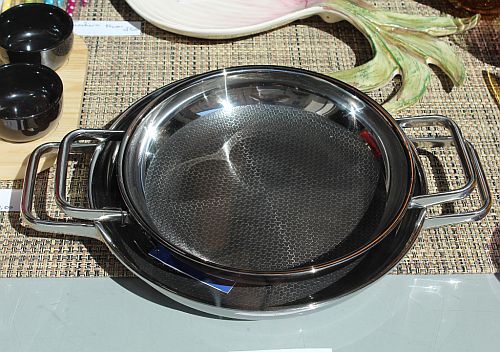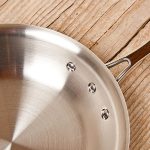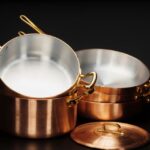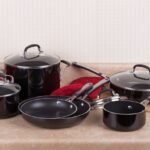Titanium is a lightweight, stable, and exceptionally strong metal. It has the highest strength-to-weight ratio of all metals. Even though it weighs about half as much as average steel, it is as strong as stainless steel.
Titanium is extremely acid-resistant and does not corrode easily; When exposed to oxygen, it forms a layer of titanium oxide that gradually builds up. The titanium oxide coating on the surface protects the metal from further degradation. When the metal is scratched, the oxide film acts as a kind of healing agent and the scratch heals itself.
Due to its compatibility with human tissue, titanium is increasingly being used in today’s modern world. It is often used in various surgical procedures and to create implants for the human body.
Titanium is not magnetic and is not a good conductor of heat and electricity. However, because it is lightweight, durable, and highly corrosion-resistant, it is suitable for many applications where these properties are required.
Titanium cookware seems to be popular at the moment and can be found in most online stores. However, there might be some confusion because most so-called “titanium cookware” is not made from pure titanium.

How is Titanium Cookware Constructed?
In terms of materials and manufacturing process, “titanium cookware” can be divided into two types.
- Cookware made from pure titanium (with or without silicone ceramic coating).
- Titanium-reinforced cookware has an aluminum base and a titanium-infused coating.
This post contains links to Amazon. The publisher may get paid if You purchase something through the links without additional costs to You.
Pure Titanium Cookware
This type of cookware is very stable, extremely light, and has some special uses. Due to poor heat distribution properties, pure titanium cookware is unsuitable for everyday cooking as it transfers heat unevenly and lacks non-stick properties. However, its light weight makes it quite suitable for backpacking adventures like camping and hiking, and is the most popular cookware for people who engage in such activities.
Pure titanium cookware is durable, does not deform due to bending, and is corrosion-resistant. To reduce sticking, the cooking surface is usually covered with a silicone non-stick coating.
Related product: Lixada Camping Titanium Cookware Set
Titanium-Reinforced Cookware
Titanium-reinforced non-stick cookware uses a cast aluminum base to ensure quick and even heat distribution and good heat retention. The aluminum core conducts heat seven times faster than steel or iron. The base has a titanium-enriched ceramic coating.
The addition of titanium increases durability and ensures better cooking performance. This non-porous coating also prevents the aluminum base from coming into contact with food.
Related product: Goodful 12 Piece Cookware Set with Titanium-Reinforced Premium Non-Stick Coating
Is Titanium Cookware Safe?
Pure titanium is considered a safe metal for making cookware because it is non-toxic, inert, and does not affect the food taste.
With titanium-reinforced cookware, the safety depends largely on the materials used in the coating for nonstick properties. Some manufacturers claim that they do not use ceramic mixed with titanium at all. For example, Young Living’s Titanium pans have a cast aluminum base and the inner surface is coated with a patented non-stick and scratch-resistant titanium coating. The titanium layer prevents aluminum from penetrating the food.
The non-stick feature reduces the amount of oil needed to cook the meal. Therefore, titanium-reinforced cookware can be a good choice for health-conscious individuals.
The surface of high-quality titanium-coated cookware will not chip, even when you use metal utensils. Even if the surface peels off, the chemically inert titanium has no toxic effect if ingested. There have been no reported cases of titanium allergy and titanium is considered a non-toxic substance.
With cookware with a titanium-infused ceramic coating, the metals and alloys used in making the base will not penetrate your food because this cookware is non-porous. Additionally, the materials used to provide the non-stick properties are non-toxic and non-reactive. Some of these materials are used to make implants for medical purposes. Titanium and titanium-enriched ceramic-coated cookware is considered non-reactive and safe for cooking. However, if you are thinking about purchasing such cookware, be sure to check all the substances used in the production of the non-stick coating. This way you can be sure that the coating is free of PFOA, nickel, heavy metals, and other harmful substances.
Advantages of Titanium Nonstick Coating
Some manufacturers claim that titanium-infused coating provides enough benefits to justify the high prices. These benefits include:
- Scratch-Resistance and Durability: Since ceramic coatings are fragile and require hand washing and plastic or wooden utensils, titanium is added to the coating to increase wear resistance and ensure the long life of the cookware. Titanium-infused cookware has a durable and abrasion-resistant surface that offers greater durability than average nonstick coatings. Even after excessive use, the cookware retains its brand-new look and stylish appearance. The coating is suitable for metal utensils. Normal deterioration from using metal utensils does not affect cooking performance. Knives can leave small scratches that would only represent physical defects, and the pan can still be used safely. Certain brands of titanium-infused cookware come with a 20-year surface performance guarantee.
- Cooking with Less Fat: Due to the non-stick properties of the titanium-infused ceramic coating, you don’t need to use oil, fat, or butter when cooking food. This makes cookware with a titanium-reinforced ceramic coating ideal for fat-free or low-fat cooking. The non-stick coating on this cookware prevents your food from burning, even when cooked at high heat.
- Easy Cleaning: This is one of the biggest benefits of titanium-coated cookware. It can simply be wiped clean with a cloth or washed with warm soapy water and a sponge. Some brands of titanium-coated cookware can be placed in the dishwasher. Another plus point is that you never have to season a pan with a titanium-reinforced ceramic coating.





Coating of Ti on the the surface of every type of steel can make it cost effective and value added. But pure Ti is lighter in weight.
I need to know where I can obtain a titanium cookware. I mean genuine titanium cookware.
This reply may be late but may be useful for others.
SALAD MASTER COOKWARES based in U.S
Texas to be precised, gives you the best titanium coated COOKWARES.
Costco has three pans for twenty bucks on sale, I love mine
I am waiting to hear from you thank you.
You can try on Amazon.com.in Sport & Outdoors department, Campfire Cookware, Material-Titanium.
I purchased my titanium frying pan about 6 years ago. I like it very much, but in the last few year I noticed a pebble effect on the surface. Should
I be concerned about it?
My friend shared this site with me with Titanium coated cookware.
mstorebuy. com
try titaniumcookwarecollection com
imported from Germany
Thank you for this well-presented, in depth article on titanium-coated cookware as my son has spent a $ubstantial $um on same and I am currently using the products.
I am wondering if you know any suppliers who may be able to give me info on “meshing ” that may be used in surgical procedures with the same properties as titanium?
Thanks for any assistance.
Kind regards,
Jean Astone.
Sorry, I don’t know any suppliers. Maybe someone else can help.
Hi Jean it’s Emmie here hope you’re doing well. Have a look at the name of the company Saladmaster.com it’s made from 316Ti titanium surgical stainless steel. Hope it will help you. And you want to hear more about it please don’t hesitate to email me. Here’s my email add emsqb357@ hotmail.com.
Warm regards,
Emmie
You really have to be careful about what is labeled as a titanium pan. For example, I almost purchased an Analon Titanium Pan from Amazon, but when I dug into the details, it appears that only the exterior has a coating that includes titanium. Otherwise, it is an aluminum pan with an interior non-stick surface called “Dupont Autograph,” which, when I looked that up, is a Teflon coating.
I have other expensive, German made titanium cookware, and now I’m suspicious of all of it. After all, if you have set aside your stainless steel pans for the convenience of non-stick cooking, then the main thing to be concerned about is what the non-stick coating is actually made of. It’s likely not titanium at all, since this article describes titanium as sticking to food. I thought my expensive, $100 titanium pans were an improvement over Teflon, but at this point I have no idea what their cooking surface is really made of. Perhaps they are all Teflon. Dupont’s data sheet describes its Autograph coating as a more durable Teflon.
I have a Cuisinart titanium saucepan which my youngest son used an abrasive pad on to clean. It now has scratches all over the sides. Is it okay to use? If not, where can I get another one?
Real titanium cookware are not sold online or shop. Those are either fake or secondhand. You will need to visit one of the authorised dealer offices to notice the difference. If u need more advise let me know
hi Finest Health, please tell me where to buy from dealers mentioned in your comments. thanks.
I have been reading the series of articles.All the posts are helpful and I will heed the advice. Really we needed careful about what is a titanium pan I think people Don’t leave it unattended.
So many websites are putting a disclaimer that forces you to accept cookies just to use their website. I hate it! It’s rude, it’s uncaring, it erodes human rights, and it’s against accessibility, and should be against the law. STOP. Sorry if this shows up twice, there looks to be trouble with the comment system.
Website owners targeted towards EU citizens must put this cookie notice to make sure their website complies with the law. Personally, I don’t use cookies and I don’t collect any personal information from my visitors,(you even can leave a comment without any identification) but some websites I link to might use cookies, so that is why I am required to put this cookie notice.
I am a quadriplegic (tetriplegic in all English speaking countries except the US) and since I’m paralyzed from the shoulders down, I must rely on my care aides to do my cooking. Unfortunately they are more destructive than a demolition crew. They do things using serrated knives on no-stick surfaces, running very cold water onto a very hot pan, leave dirty pans in the sink either dry (so that foods dry on) or soaking in water (which caused my great-grandmother’s 120+ year old cast iron fry pan which they were told never to use to rust) I’ve been buying new pans on average every two months because that’s how little time it takes them to render the pans unusable. What I would like to know is what the most bullet-proof non-stick pan available is? Can it stand up to all manner of abuse, or am I better off bankrupting myself by purchasing new pans every couple of months?
Can you change the aidees? Seriously. If you tried to instruct them on handling the cookware properly and they still won’t do it, if it were me, I’d change the people because that crosses the line into being either idiots or non-caring a-holes.
P.S. Stainless steel used on medium to medium-high heat doesn’t have the food sticking and is durable. I bought two stainless steel Calphalon pans off of Amazon, have them for over a year and I love them!
Is there anyone who has used the Saladmaster – https://saladmaster.com/en-gb/ cookware? Is it true Titanium?
I went to a Saladmaster store for a cooking show/ sales promotion event, they said it was a stainless steel alloy with titanium in the mix. It’s not pure titanium.
Regarding titanium metal as cookware, we learned in metallurgy class that pure titanium is chemically stable in ambient temperature environment. Using it in salt heavy situations such as ocean going vessels, titanium is far superior than the best stainless steels (the best stainless is a low carbon version of 302 alloy). However, once titanium reaches 400-450 deg F and higher, it corrodes faster than bare iron. For this reason, aerospace jets such as the SR-71 have to be cleaned throughly to prevent sheet metal failure through stress corrosion cracking. It reacts with the chlorine from your bare hands and forms tiny pits in the metal. I don’t know if the resulting titanium chloride is a problem to humans. There is also the leaching of bare titanium to form titanium oxide, again it occurs at much higher temperatures- about 500 deg F.
We are about to purchase a set of cooking utensils from Saladmaster and hence the need to look up articles on Ti. I am still not convinced on whether Ti is the best solution or just a “better than”, to merit the exorbitant price being asked of Saladmaster.
Couple of my friends bought Salad master cook set ware for about £4k but I don’t think is worth paying it.
Whatever you do, DO NOT purchase T-fal Extreme Titanium set – I was excited because they are lightweight and I have horrible wrists, but they release an odor while exposed to even medium temp on the stove, which was then tasted in food – SO NOT what I was looking for…
Guess I’ll try ceramic as I’m not a millionaire LOL
Checking out NutraEase 316 titanium cookware sold by reps and very $$$ pricey but sounds wonderfully healthy with the safe titanium plus low temp waterless feature. Cooking over 190 degrees changes many foods to simple sugars they claim. Any experience with this, please comment.
Beware ‘titanium infused; non-stck coatings – they are PTFE-based,
Hi, I “inherited” a small frying pan (from an old housemate) that says Titanium TM on the handle. on the underside of pan it says Handguss Germany. Does anyone know about the construction of this pan or where to find reviews? Google search hasn’t helped me with this question.
Wish articles would. Just say if titanium is safe and why, if not safe, why?
There is too many if this or that is added or not added. Is non stick cookware safe or not? Is there a brand of nonstick cookware that is safe without worry of chemicals seeping into your food. Name the brand”….. Spent hours looking at articles about nonstick cookware and I am still unsure if it is safe. Just bought Curtis Stone titanium over forged aluminum nonstick cookware.. Wondering if the aluminum will leak through. The claim is that you can use metal utensils with this cookware which I would be skeptical of doing anyway.